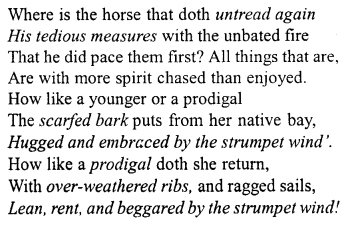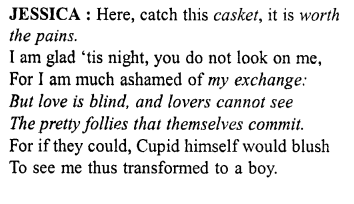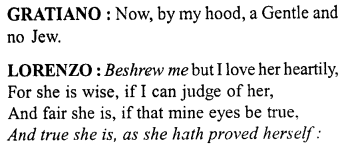Merchant Of Venice Act 2 Scene 6 Questions And Answers
ICSE SolutionsSelina ICSE SolutionsML Aggarwal Solutions
EnglishMathsPhysicsChemistryBiology
Act 2 Scene 6 Merchant Of Venice Workbook Important Questions and Answers
Passage – 1 (Act II, Sc.VI, Lines 10-17)

Paraphrase :
Where is the horse that retraces his boring steps again with the same fire that he walked them in the first place? All things that exist are sought for with more spirit than the spirit to enjoy them. How the sailing ship leaves her native port like a youngster or a spendthrift Hugged and embraced by the prostitute wind! How she returns like the spendthrift, with weather-beaten sides and ragged sails, Thin, tom, and destitute by the prostitute wind!
Word Meaning With Annotation
Untread again his tedious measures : retrace his steps over the ground where he has performed tedious walking, younker : a young man, literally, a “younger”, scarfed bark : the ship which is ornamented with gay scraf or flag, hugged and embraced by the strumpet wind : “strumpet” is an immoral woman; a prostitute. The wind is said to meet the ship with just such caresses as such a woman gives a reckeless young man. prodigal : this is an allusion to the parable from the Bible which tells of the prodigal son, the young man who asked his father to advance his share of the inheritance, then went away into far-off countries and squandered it all. In the long run, he was compelled to come home, sad and poverty-stricken, over-weathered ribs : “greatly beaten by the rough weather.” lean, rent, and beggared by the strumpet wind : just like the prodigal son returning home, thin, ragged, and reduced to poverty by the wicked women (so has the ship been treated by the wind)
Read the above passage and answer the following questions
Question 1.
What is the context in which the above speech is made?
Answer:
Above quoted speech made by Gratiano is from Act II, Scene 6 of the play. Gratiano just like SALANIO is surprised that Lorenzo is staying away beyond the appointed hour for newly-made lovers are usually keen to keep the time. Gratiano feels that Lorenzo has been very quick in making promise of his love to Jessica but is very slow now is making his appearance to keep that promise.
Question 2.
What is the main idea expressed in the above quoted,passage?
Answer:
The central idea of the above mentioned speech is that all things are pursued with great eagerness but when they have been achieved, there is not the same eagerness in enjoying them. Gratiano amplifies the idea expressed by SALANIO in the previous speech. This idea has been elaborately expressed by using many similies. Gratiano says that there is no horse which retraces its steps with the same energy and vigour which it had displayed when it had set out on a journey.
Question 3.
What is the meaning of the words ‘prodigal’ and ‘scarfed brak’.
Answer:
‘Prodigal’ refers to the parable of the prodigal son in the ‘New Testament’ who left his father’s home after taking his share of his father’s property but squandered it away and returned home. However, he was welcomed home by his father even when he had lost everything. The word ‘scarfed bark’ means a decorated ship. The word bark here signifies a ship or a vessel.
Question 4.
Explain the phrase ‘strumpet wind’.
Answer:
The phrase ‘strumpet wind’ refers to the wind which keeps changing in intensity and direction and is therefore not faithful to the sailors. The word strumpet means a prostitute. The wind is here called a strumpet because wind like a prostitute is not dependable.
Question 5.
Explain the meaning of the last three lines of the above quoted speech.
Answer:
Gratiano says that when a ship returns from its voyage it looks worn-out and heavily damaged and its condition at this time is similar to that of the prodigal young man who has been robbed of all his money by the prostitute. Here Shakespeare has referred to the story of the prodigal son in the Bible, who has been beggared by harlots.
Passage – 2 (Act II, Sc.VI, Lines 32-40)

Paraphrase :
JESSICA : Here, catch this chest; it is worth the trouble. I am glad it’s night so that you can’t see me, Because I am very ashamed of my costume; But love is blind, and lovers cannot see The pretty mischief that they themselves commit, Because, if they could, Cupid himself would blush To see me transformed to a boy like this.
Word Meaning With Annotation
Casket : the box of gold and jewels which she is taking away, worth the pains : you will find the contents make it worth your trouble, my exchange : my change into boy’s dress, but love is blind, and lovers cannot see, the pretty follies that themselves commit : the classical god of love, Cupid, is always represented as a blind boy, with bow and arrow. So the idea here is that just like Cupid, lovers are always blind to each other’s faults.
Read the above passage and answer the following questions
Question 1.
What is the occasion for the above quoted speech?
Answer:
The above given words are spoken by Jessica to her lover Lorenzo. She is planning to elope with her lover in the absence of her father Shylock. Jessica throws a casket containing her father’s Jewels and gold to Lorenzo from a window. Then she apologies for being dressed in the guise of a boy.
Question 2.
What light does the above mentioned speech throw on the character of Jessica?
Answer:
The above mentioned speech proves that Jessica does not care at all about her father. She is not a devoted daughter. In the absence of her father Jessica plans to elope with her lover Lorenzo without caring for the feelings of her father. She does not think of the pain that her father would feel because of her act. She is also materialistic because she intends to take away with her a casket containing her father’s jewels.
Question 3.
From the above quoted speech what information can you gather about relation between Lorenzo and Jessica?
Answer:
It is clear from the given passage that Lorenzo and Jessica are deeply in love with each other. They are very intimate with each other. Lorenzo goes to Jessica’s house at night in the absence of her father to help her to escape from her father’s house. Jessica is also keen to run away with Lorenzo without caring for her father.
Question 4.
Why is Jessica feeling ashamed?
Answer:
Jessica is ashamed of appearing in her uncommonly disguise of a boy. She regrets wearing a boy’s clothes of which she is feeling ashamed.
Question 5.
Explain the last four lines of the passage.
Answer:
In the above mentioned lines Jessica says that love is blind or uncritical and a lover cannot realize the folly of some of the foolish things he does. She feels that if lovers could realize the absurdity . of their actions even Cupid would blush with shame to see her changed into a boy.
Question 6.
Illuminate the relevance of ‘Cup-id’ in the above passage.
Answer:
‘Cupid’ is the god of love who is figured as being blind. The reference to Cupid is important in this passage because Cupid is figured as boy which Jessica is now disguised as.
Passage – 3 (Act II, Sc.VI, Lines 51-57)


Paraphrase :
GRATIANO : Now, I swear, she is a Gentile and no Jew.
LORENZO : Curse me, but I love her heartily; Because she is wise, if I can judge her, And she is beautiful, if my eyes can really see, And she is true, as she has proved herself; And so, like herself, wise, beautiful, and true, She shall be placed in my faithful soul.
Word Meaning With Annotation
Beshrew me : a mild oath, by my hood, and true she is, as she hath proved herself : it is ironical that the term “true” should be applied to Jessica as she is in the act of robbing her father, shall she be placed in my constant soul : shall her memory remain in my faithful heart.
Read the above passage and answer the following questions
Question 1.
Explain the context in which the first speech of the above mentioned dialogue is made.
Answer:
These words spoken by Gratiano in Act II, Scene VI are his comments on Jessica’s nature. Jessica has disappeared from the upper window after telling Lorenzo that she will soon bring some more gold coins with her. Now Gratiano says that though Jessica is the daughter of a Jew yet she has not inherited any bad qualities of a typical Jew.
Question 2.
What light does the above quoted dialogue throw on the character of Jessica?
Answer:
The above mentioned dialogue reveals Jessica in a positive light. She is praised by both Gratiano and Lorenzo. Gratiano says that though she is a daughter of a Jew yet she has the good qualities associated with non-Jews or Christians. Lorenzo also admires her good qualities by describing, her as beautiful, wise and faithful.
Question 3.
Critically analyse Gratiano’s comment in the above quoted dialogue.
Answer:
Gratiano’s comment shows his contempt for the Jews. He associates Jews with evil qualities. He says that though Jessica is a Jew yet she does not have the evil qualities of a Jew. These remarks of Gratiano shows his arrogance as he, believes Christians to be associated with the good qualities.
Question 4.
What inference can you draw about Lorenzo from his speech?
Answer:
Lorenzo’s speech shows that he is deeply in love with Jessica. He says that he will always be loyal to Jessica and she will always live in his heart. He pays compliment to her by describing her as beautiful, wise and faithful. He is a passionate lover who is deeply in love with Jessica.
Question 5.
What does the phrase ‘by my hood’ and ‘gentile’ refer to in the first line of the first speech?
Answer:
The phrase ‘by my hood’ is an oath which Gratiano swears. ‘Gentile’ means one who is not a Jew, hence here a Christian.
Merchant of Venice Workbook Questions and Answers
- Merchant of Venice Act 1 Scene 1 Workbook Answers
- Merchant of Venice Act 1 Scene 2 Workbook Answers
- Merchant of Venice Act 1 Scene 3 Workbook Answers
- Merchant of Venice Act 2 Scene 1 Workbook Answers
- Merchant of Venice Act 2 Scene 2 Workbook Answers
- Merchant of Venice Act 2 Scene 3 Workbook Answers
- Merchant of Venice Act 2 Scene 5 Workbook Answers
- Merchant of Venice Act 2 Scene 6 Workbook Answers
- Merchant of Venice Act 2 Scene 7 Workbook Answers
- Merchant of Venice Act 2 Scene 8 Workbook Answers
- Merchant of Venice Act 2 Scene 9 Workbook Answers
- Merchant of Venice Act 3 Scene 1 Workbook Answers
- Merchant of Venice Act 3 Scene 2 Workbook Answers
- Merchant of Venice Act 3 Scene 3 Workbook Answers
- Merchant of Venice Act 3 Scene 4 Workbook Answers
- Merchant of Venice Act 3 Scene 5 Workbook Answers
- Merchant of Venice Act 4 Scene 1 Workbook Answers
- Merchant of Venice Act 5 Scene 1 Workbook Answers
